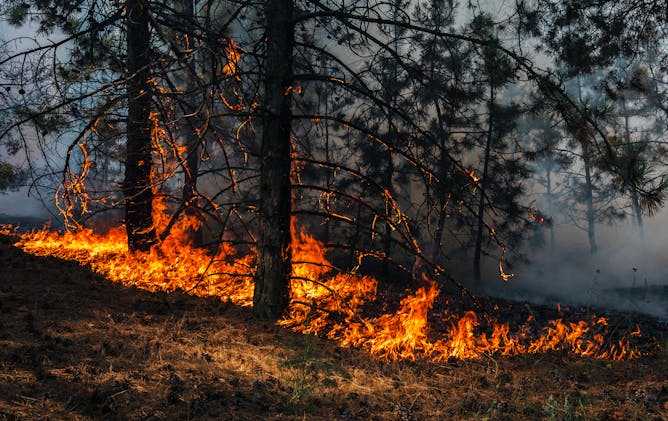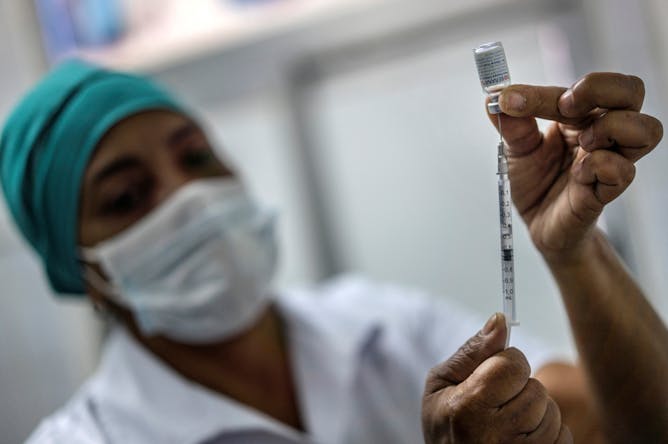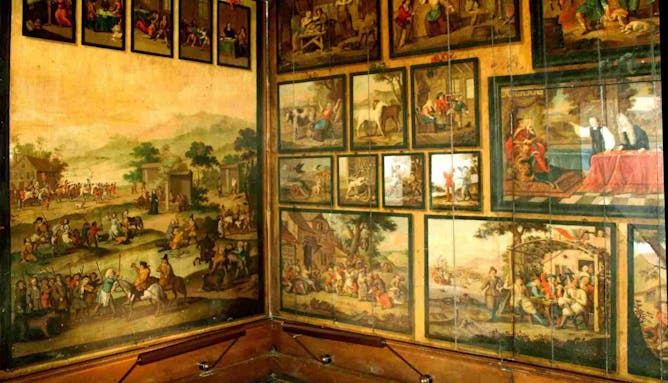|
|
|
|
The year is 2100. By ditching fossil fuels, shifting to plant-based diets and restoring vibrant ecosystems over much of Earth’s surface, the world has stopped global warming at 1.5°C. Future generations breathe air cleaner than at any time since the industrial revolution. High-speed trains connect major cities and buildings ripple with photoelectric skins generating clean solar energy.
This is one vision of the future. The other, described in a new book by Professor of Earth System Science at UCL, Mark Maslin, synthesises the latest science to imagine a world where we instead do nothing to address climate change. As global temperatures reach 4°C at the end of the 21st century, coral reefs dissolve, mega-cyclones rage, crops wither and new diseases proliferate. The choice may be clear, but which outcome will the world arrive at? It depends on what actions the international community takes today and in the coming years.
In the latest episode of The Conversation Weekly podcast, three experts discuss Cuba’s effort to develop its own COVID-19 vaccine, and how it may affect the course of the pandemic. And after a fantastic piece of academic sleuthing over lockdown, MA Katritzky writes about her exciting find of a lost set of William Hogarth paintings in a house in Wiltshire.
Results from 'Super Thursday' will be flowing in today and tomorrow. Stay tuned for analysis on that key by-election in Hartlepool, the mayoral race in London and, of course, the all-important vote in Scotland.
Over the next few weeks we’re asking readers to help support what The Conversation does by making a donation. If you’ve already donated, thank you very much. Any amount, whether as a monthly donation or a one-off gift, provides crucial resources to support our objective, public interest journalism.
Donate
now
|
Jack Marley
Environment + Energy Editor
|

|
|

Lumppini/Shutterstock
Mark Maslin, UCL
A future of heat and strife or humanity’s finest hour – our response to climate change today will define the 21st century.
|

Cuba’s Soberana 02 coronavirus vaccine is one of two in phase 3 clinical trials.
Ramon Espinosa/EPA
Gemma Ware, The Conversation; Daniel Merino, The Conversation
Plus, a psychologist on how we look back at our big decisions in life. Listen to episode 14 of The Conversation Weekly podcast.
|

Ukiws/Wikimedia
M A Katritzky, The Open University
The style and date given for the painted room never sat right with MA Katritzky, who spent lockdown investigating whether the room was actually created by one of Britain's greatest painters.
|
Politics + Society
|
-
Julia Laite, Birkbeck, University of London
A missing girl, a sensational trial, and the troubled history of anti-trafficking.
-
Seán McConville, Queen Mary University of London
Why would a group of people decide to spend months and years living semi-naked in squalid conditions?
-
Beatrice de Graaf, Utrecht University; Ahmet S. Yayla, DeSales University
The IS 'caliphate' centred on Mosul, had its own justice system served, efficiently, by its own police force.
|
|
Health + Medicine
|
-
Farasat Bokhari, University of East Anglia
It's not clear whether the TRIPS agreement is what's getting in the way of vaccine supply, and waiving intellectual property rights may stifle future innovation.
-
Sumit Mazumdar, University of York
The Indian government spends just US$38 per person on healthcare each year.
|
|
Business + Economy
|
-
Evronia Azer, Coventry University
Companies are using myriad ways to check up on employees at home, from keylogger software to webcam monitoring.
|
|
Arts + Culture
|
-
Tom Phillips, University of East Anglia
The sport has seen a revival in recent years. But it will take regulation to remove its reputation as a low-brow form of entertainment
|
|
Science + Technology
|
-
Elaine Fahey, City, University of London
Trump will not be returning to Facebook or Instagram before November 2021.
|
|
| |
Featured events
|

|
Online, Online, Oxfordshire, Online, United Kingdom of Great Britain and Northern Ireland — University of Oxford
|

|
University of Reading, Whiteknights House, PO Box 217, Reading, Reading, RG6 6AH, United Kingdom of Great Britain and Northern Ireland — University of Reading
|

|
Online, Cambridge, Cambridgeshire, CB11PT, United Kingdom of Great Britain and Northern Ireland — Anglia Ruskin University
|

|
Outreach, CHE 3.26, University of East Anglia, Norwich Research Park, Norwich, Norfolk, NR4 7TJ, United Kingdom of Great Britain and Northern Ireland — University of East Anglia
|
|
|
|
| |
| |
| |
| |
| |
|
|
|
|
|
|
|